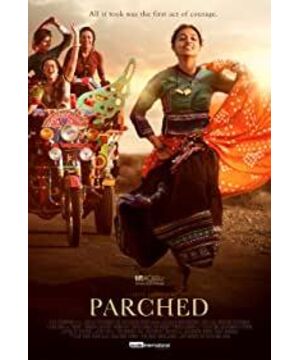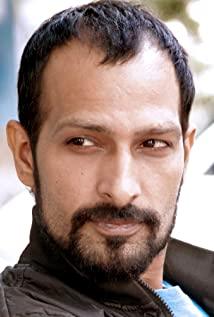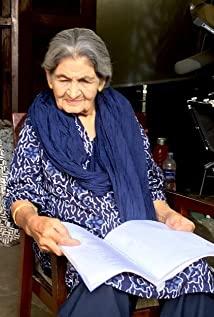While having dinner, I patiently watched the Indian movie "Hot". Because the plot does not have ups and downs like a roller coaster, but unfolds slowly like a family, and there are few bright spots in the dialogue, it is inevitable to be sleepy to watch, so until the end of the film, three women who escaped at the crossroads decided to listen to their hearts. It was only when I started to slowly recall what "hot" meant for the whole movie.
The scorching heat was nothing more than a fire, which killed the drunk husband who beat La Qiao. At the same time, another fire was lit in the Tokachi celebration to celebrate Rama's victory over the ten-headed demon Ravana. Rani, La Qiao, and Bikili chose to escape from the chaos on this festival, in pursuit of the paradise of freedom. Could it be that they alluded to the meaning of the Ten Victory Festival and defeated feudal patriarchy as weak women?
The scorching heat also shows the living conditions of women in conservative villages. In the old saying, "people are the knife, and I am the fish." In the vernacular, it is like ants crawling back and forth on a hot pan. A village ruled by a group of white-robed and hooded elders places women in a position that cannot be lower, such as Chinese feudal society requiring women to bind their feet and not allow women to ride alone on buses, wear jeans, show their faces and have their own jobs, etc.
Just like Grandma Liu's nonsense saying "the fire burned the caterpillars" when she entered the Grand View Garden, this fire burns out all the caterpillars that are not stiff, which also means that the ancient feudal system will be reformed one day. .
The pursuit of truth is one of the themes. In the film, the village holds a meeting of elders to punish the fleeing woman, and the first thing the audience thinks of is the stubbornness of the old-fashioned old man in Fang Long's work "Tolerance". And the man who wanted to install cable TV in the village to improve everyone's life but was beaten to death by the prostitutes is undoubtedly the incarnation of the sacrificed pathfinder in "Tolerance". Breaking this relationship clearly, it will be clear at a glance what the film wants to explain. But the audience did not expect a happy ending. The couple representing the "civilized people" in the village moved out permanently, leaving the ignorant village to continue to be ignorant.
Defending feminism is a central theme of the film. However, the feminism shown by the director in the film and the freedom, equality, and spirituality of modern women advocated by the film are obviously deviated. "Hot" is only narrated on the theme of sexual autonomy, and expresses the women's desire for sex in the village with crude and straightforward jokes. In fact, the point is just right, and the film has gone too far here. The widowed Rani is looking forward to meeting the lover she has never met on the phone; the infertile La Qiao is eager to have children, and finally chooses to take risks to marry other men; the betrayed Bikili chooses to escape the circus and start a new life... Essentially, it's all just a revolt caused by the long-term repression of sexual autonomy.
So, did the three of them escape the village to achieve the defense of feminism? Far-fetched, too far-fetched! Not to mention that the survival problems they faced after they fled were not discussed further, just like a fairy tale needs a sentence at the end of the story, "The prince and princess have lived a happy life since then." Can they escape successfully? Do quads need refueling? Will anyone in the village come to arrest them? Of course, the poor foreshadowing is that the craftsmanship of pulling buckwheat is doing well and can support himself. The author is not here to suspect that the three of them cannot survive without men, but I feel that in a turbid environment, no matter how hard Shimizu struggles, it will be swallowed and assimilated. If the thinking and concepts of the vast majority of people are not changed, a mere escape can only be an idealistic short-lived.
Regarding the details, there are many touching scenes in the film, such as the scene of Lu Qi and La Qiao applying medicine to each other after being injured by their husband, such as the scene of Rani and daughter-in-law embracing and crying after Rani's son is gone, such as Rani chose to let Lu Qi go to complete the scene with her classmates. The film uses a lot of pen and ink to describe Rani, making the author to her from disgust to understanding to sympathy and finally admiration, the emotions can be described as twists and turns.
In recent years, there has been no shortage of "Wrestling!" starring Aamir Khan in the Indian film market. Dad" is a film that focuses on women's human rights. Chinese audiences can enhance their understanding of Indian culture by watching movies, and at the same time, they can compare it with the traditional domestic moral values, and then reflect on what we should pay attention to besides food and clothing and a well-off life. After all, the whole world is like a dark web, 10% of the content is exposed on the surface, and the rest is hidden underwater waiting to be awakened. A cliche quote from a French proverb: Sunlight is the best antiseptic. I also wish women in India their due rights and status as soon as possible.
I give this movie a 7.
The picture is selected from the Internet. If there is any infringement, please leave a message in the background. This platform will delete it in time
About the author: Hina Baichuan, a curious sleeping god, has rich experience in various shallow literary and artistic attempts, such as poetry creation, science fiction, drama director, animation production, art design, etc. In June 2015, the public account "Who's Tulip" was created. (Personal WeChat ID: IcyConnieCat315)
View more about Parched reviews











